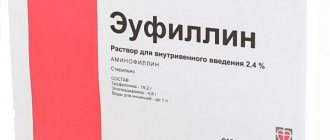Cystitis is a fairly common problem, especially in women. Inflammation of the bladder, accompanied by pain when urinating, can occur for various reasons. The discomfort in this case is not very strong, so some patients do not go to the doctor, but buy medications at the pharmacy on their own. One of the most common drugs for cystitis is Furosemide. This is a fairly effective diuretic, which has been the most popular among various patients for many years. But recently, doctors have been trying to prescribe it rarely for cystitis, and only as part of a comprehensive treatment. This is explained by the peculiarities of the drug’s action and the fact that more effective and safe means have appeared.
What are diuretics
Diuretics (diuretics) in medicine are substances that have different chemical structures, but have common characteristics due to the ability to remove a larger volume of fluid from the body. The action of diuretics slows down the process of reabsorption (absorption) of salts and water in the filtering system of the kidneys, ensuring their excretion with urine in much larger quantities.
In addition, they are able to forcefully increase the amount of urine, reducing the level of accumulated fluid in various cavities and tissues. The special properties of diuretics have found their application in the complex treatment of various conditions and diseases accompanied by signs of swelling and urological disorders.
The ancestor of diuretics is mercury. At the beginning of the 19th century, drugs based on it were widely used in the treatment of syphilis. Although the effect was minimal, doctors noted the good diuretic properties of such drugs. Soon, mercury compounds were replaced with less toxic substances, modifying safer and more effective diuretics based on them.
Opinions of patients and doctors
Reviews from the majority of patients who took the diuretic Furosemide indicate that the drug does not give a good result in the treatment of cystitis, which is not surprising. After all, the effect of the drug is achieved due to its diuretic effect, which does not lead to recovery in all cases.
Today, there is a wide range of medications that can cure cystitis in a short time. Furosemide, alas, is not included in this list. There have been many cases where, after taking the drug, patients’ physical condition deteriorated, dizziness, nausea and other adverse reactions occurred due to intolerance to the diuretic composition.
There are also cases where patients neglected the dosage or did not comply with the conditions for use, and then the medication provoked Quincke's edema or anaphylactic shock. These serious consequences can only be eliminated with the help of qualified health workers and expensive medications.
Only a small percentage of patients respond positively to this medicine, since the disease has not had time to affect the entire organ system and cause complications. Hence the conclusion is that in case of pathology associated only with pathogenic microbes, the drug gives results after completion of the therapeutic course.
Experienced doctors unanimously declare that Furosemide does not have the necessary properties that quickly and effectively eliminate cystitis. But, it is still prescribed in combination with other drugs to ease the symptoms of the disease.
Doctors' point of view:
Vitaly Pavlovich, urologist
As a fairly experienced doctor, I want to tell everyone that the use of Furosemide during cystitis is unjustified. The drug is a powerful diuretic that flushes potassium, magnesium and other elements needed by a person from the body. Everything can end disastrously, especially if a person self-medicates. Oddly enough, a diuretic can even cause kidney failure. I recommend that you drink plenty of water and you will achieve the same effect as this medicine. And it’s less harmful to health.
Reviews and advice on taking Furosemide from patients:
Yulia, 38 years old
Hello everybody. I have had cystitis for a long time and it has become chronic. Those who are familiar with this problem, I think, understand me. During acute pain due to chronic cystitis, not a single medicine can save me, including antibiotics and various painkillers. The only things that help are diuretics, herbal teas (unfortunately, I can’t drink them in large quantities, nausea starts), plain water in large quantities, or just 1 tablet of Furosemide. I read a lot of different reviews about it on the Internet, some even use it to lose weight. Almost everyone says that the body gets too used to this diuretic. I didn't notice such an effect. I can only say good things about these tablets; they are guaranteed to help me with pain.
Nadezhda Ivanovna, 44 years old
Personally, I had a sad experience of using Furosemide for cystitis. It turned out that the illness took hold of me for the weekend, and I decided to go to the pharmacy to buy temporary medicine to relieve the pain. Well, go to the doctor on Monday. The pharmacist recommended this remedy to me. I took 2 tablets at once, so that it would probably start here too... After running to the toilet 7 times, my mouth was dry, I was very thirsty, and when I drank I started to feel sick, I eventually lost consciousness, I had to call an ambulance. And the saddest thing is that after this, long-forgotten heart diseases reminded of themselves, the pressure did not return to normal for a long time, and my kidneys also became ill and had to be treated. So look what happened, self-medication + advice from people who don’t understand the matter.
Maria, 32 years old
Personally, Furosemide was prescribed to me for the treatment of cystitis together with an antibiotic. I can say one thing, it really took away the pain, and I ran to the toilet many times. The rest, it seems to me, was done by antibiotics. In general, the product is normal.
Tatyana, 24 years old
In addition to the antibiotic, she prescribed the diuretic drug Furosemide to me when I developed cystitis. The doctor justified this by saying that urine stagnated in the bladder, where an infection formed. I was treated with the course as expected, took everything in accordance with the selected dosage, there were no adverse reactions. They also strongly recommended drinking a lot of water, since diuretic tablets expel all fluid from the body and must be replaced. In general, I didn’t find anything wrong with the product, although I read a lot of negative reviews about it.
Principle of action and result of reception
Diuretics, due to their chemical properties, actively influence the intensity of renal functions and abundant micturition. With the development of cystitis, inflammatory reactions in the cystic cavity disrupt the processes of diurination (emptying), creating the preconditions for rapid bacterial proliferation.
Despite the painful symptoms (pain, burning, cramping), diuretics for cystitis are prescribed to create increased urination (forced diuresis) to quickly flush out the infection and its metabolic products from the urinary organs.
The effectiveness of this method is explained by the simultaneous consumption of an increased amount of fluid by the patient and the intake of prescribed diuretics. If normal indicators of minute urine formation are from 0.5 to 1 ml/min., then with forced diuresis, these indicators increase 10 times. This feature does not give the infection a chance to spread and brings it out along with the infections.
Diuretics in the treatment of cystitis are an adjunct to the main therapy. With increased diuresis, pathogens do not have time to gain a foothold on the mucous epithelial layer of the bladder cavity and create infectious foci. At the beginning of the development of the disease, to stop the inflammatory process, drinking plenty of water and taking natural herbal remedies with a diuretic effect are prescribed. Only if herbal medicine fails, a complex of medications is prescribed.
Overdose and side effects
Taking Furosemide for cystitis may cause some adverse reactions. Although they occur extremely rarely, you need to familiarize yourself with them before treatment.
Possible side effects from using a diuretic drug:
- drop in blood pressure;
- decreased concentration of leukocytes, thrombocytopenia;
- dehydration of the body;
- dyspepsia, constipation, nausea with vomiting;
- dry mucous membranes, constant thirst;
- muscle weakness, migraine;
- urinary retention;
- allergic manifestations.
With a strong increase in dosage, there is a risk of severe adverse reactions. There may be allergies in the form of rash, dermatitis, urticaria, itching, erythema.
With a significant overdose, there is a possibility of a strong drop in pressure, even collapse. The patient may experience drowsiness, apathy, and impaired consciousness.
Consequences of overdose from various systems:
- CVS - collapse, cardiac arrhythmia, tachycardia, orthostatic hypotension;
- sense organs – hearing impairment and decreased vision;
- Gastrointestinal tract - sudden weight loss, severe thirst, vomiting, exacerbation of pancreatitis, jaundice, diarrhea;
- CNS – convulsions, drowsiness, changes in consciousness, myasthenia gravis, apathetic state, paresthesia, headache;
- genitourinary system – urinary retention, kidney inflammation, blood in the urine, decreased potency, prostate hypertrophy;
- allergies - urticaria, fever, vasculitis, chills, anaphylactic shock, exudative erythema;
- hematopoiesis – decreased number of leukocytes and platelets, aplastic anemia, agranulocytosis;
- water-electrolyte metabolism - hypokalemia, hypomagnesemia, metabolic alkalosis, dehydration, hypovolemia.
For treatment, symptomatic therapy is carried out. Gastric lavage is performed and medications are prescribed to normalize the mineral balance.
Diuretics in the treatment of cystitis
Many medicinal herbs, herbs based on proven methods of alternative treatment, and herbal-based preparations that can alleviate the unpleasant symptoms of the disease and influence the clinical course of the disease, accelerating the recovery process, have a diuretic effect in cystitis.
Acute cystitis can be easily treated with herbal uroseptics. Their advantage is due to ease of absorption, less toxicity, lack of addiction and the development of allergic reactions. Moreover, in addition to strong diuric properties, most of them combine anti-inflammatory and antibacterial effects.
These characteristics correspond to an extensive arsenal of natural uroseptics, in the form of:
- leaves and shoots of lingonberry, which has antiseptic and strong diuretic properties;
- the entire ground and flowering heather bush, which has antiseptic properties and diuric properties;
- dried flowers and herb St. John's wort. Its antibacterial property is provided by the presence of many plant extracts;
- ground part of goldenrod grass. Its effective diuretic effect allows its use in the treatment of many urological pathologies;
- buds, leaves and aspen bark - are an excellent natural anti-inflammatory, analgesic and diuretic;
- bearberry, which is similar in its properties to the action of lingonberry components (antiseptic and diuretic). Actively prescribed in the treatment of acute cystitis.
Here you can add many more medicinal herbs (garden dill, corn silk, half-half, etc.), which perform a regenerating, anti-inflammatory, antiseptic, diuric and anti-stagnant role in the treatment of inflammatory processes in the MP. Herbs with a diuretic effect in the treatment of cystitis are taken in the form of decoctions and infusions. On the recommendation of a doctor, a measured portion of dried herbs is poured with boiling water and steamed in a water bath for a quarter of an hour. Taken in the dosage recommended by your doctor.
Herbal preparations based on several herbal components, which, when specially selected, enhance and complement each other’s healing properties, have a much greater effect in the treatment of cystitis.
Such complex diuretic preparations for the treatment of cystitis perform simultaneously antibacterial, regenerating and diuretic effects, promoting rapid disposal of pathogens and complete restoration of the body.
As an example, we recommend:
- A dry blend of lingonberry leaves, knotweed herbs, yarrow and birch buds. An equal amount of components is thoroughly mixed. Take 2 tbsp. spoons of the mixture and pour 250 ml of boiling water, leave on low heat for 20 minutes to simmer. After cooling, strain and take 1 tbsp. spoon of decoction diluted in a glass of water after each meal.
- 4 tbsp. spoons of a mixture of dried chamomile flowers, lingonberry leaves, nettles and licorice roots are poured into 1 liter of boiled water and brought to a boil. After boiling, turn down the heat and simmer the mixture for 10–15 minutes. 100 ml of warm broth is taken at intervals of 4 hours.
- Infusion of dried bearberry and plantain leaves. The raw materials are crushed and mixed. 5 tbsp is poured into a liter thermos. spoons of the mixture, pour boiling water and leave for 8 hours. The doctor determines the course and dosage of the infusion depending on the severity of the clinical picture and concomitant pathologies in the patient.
Treatment of cystitis in women with folk remedies: why and what herb
When you decide to start treating cystitis with folk remedies, remember that you must consult with your doctor. Treatment for women has its own specifics, so the remedies used at home should not be allowed to lead to the spread of infection throughout the body through the genitourinary tract.
Treatment with folk remedies is a long process, and in case of acute form of the disease in women, several problems need to be solved as soon as possible:
Have you been fighting CYSTITIS for many years without success?
Head of the Institute: “You will be amazed at how easy it is to cure cystitis by taking it every day...
Read more "
- remove infection from the body,
- relieve the pain
- relieve irritation of the bladder walls,
- Increase the frequency of urination to flush out infectious agents.
Treatment with traditional medicine should accompany modern medication. Only in this case will a positive effect be achieved.
Important: ask your doctor about the compatibility of the selected herbs with the prescribed medications.
Symptoms
The clinical picture of the disease consists of:
- pain syndrome,
- dysuric disorders,
- general symptoms.
The pain is cutting and spastic in nature. Pain in the suprapubic region. They appear when the bladder is sufficiently full and its walls stretch.
In addition, pain also occurs during urination.
Dysuric syndrome manifests itself as frequent urination in small (sometimes literally drip) portions. In some cases or under some conditions, incontinence may occur.
The peculiarity of the urge to urinate is that it is an imperative (imperative) urge, this is when it is impossible to postpone going to the toilet.
Sometimes unchanged blood is present in the urine.
General symptoms accompanying the disease in women:
- chills,
- malaise,
- temperature increase,
- weakness.
Treatment
Folk remedies play an important role in the treatment of cystitis in women. What traditional medicine offers:
- herbs from which tinctures, infusions, extracts, and decoctions are prepared;
- warming baths.
Herbal medicine takes up the lion's share of home treatment advice.
Acute cystitis can be treated with herbs for a short time and is very effective. Daily use of infusions for 3-4 weeks gives a positive result, and the first significant improvement can be felt after the first seven days.
A chronic disease requires a longer time for treatment with folk remedies and is carried out during exacerbation (the treatment required is the same as for the acute phase) and remission. Anti-relapse treatment is best done in courses of 1.5 months twice a year. In this case, it will prevent exacerbation during the cold season.
- Antiseptics
Antiseptic herbs such as juniper, lingonberry, St. John's wort, chamomile, thyme, bearberry, and bogulberry have proven themselves well.
Take 1 tbsp. spoon juniper berries, chop. Build a water bath. Pour the crushed berries into the top saucepan, pour in a glass of hot (but not boiling water) water, cover with a lid and heat at a low simmer for 15 minutes. Remove from heat, let cool and strain, squeezing out the berries, into a glass and add boiled water until full. Drink 1 tbsp. spoon 4 times a day after meals. The course is from 14 to 20 days.
Important: store the broth in the refrigerator for no more than 2 days.
Relief will come after two days of use.
Important: do not interrupt the course and do not exceed the daily dose.
- Painkillers
The most effective: St. John's wort, chamomile, immortelle (sandwort), bloodroot, ragwort, tansy, and marsh grass.
Take equal parts of immortelle flowers, fennel fruits, madder roots, black poplar buds, motherwort and heather herbs, mix. Brew 10 grams of the mixture in a glass and leave it for three hours. Drink three times. Course - 1 month.
- Anti-inflammatory
Use: oak bark, licorice, bergenia leaves and roots, alder fruit, urban gravilate.
Tatar leaves are excellent for relieving inflammation in women. You can make an infusion from it, or you can mix it with dill seeds and also make an infusion. Take small doses, about three times a day.
For chronic conditions, decoctions of mint, black nightshade, black poplar, dill and even carrot tops help well.
To treat cystitis, our readers successfully use Galina Savina’s method
This cheap odorous remedy will get rid of cystitis forever! Sold in every pharmacy, called...
- Diuretics
Many of these herbs also have diuretic properties. However, horsetail (cannot be used if there is blood in the urine) and knotweed are the most effective in treating cystitis in women.
Two tbsp. spoons of horsetail, pour a liter of water, put on low heat. Boil for 15 minutes, turn off and let stand for 20 minutes, strain. Take a glass three times a day.
For a disease such as cystitis, it is necessary to use a decoction of bearberry, which has the best effect on the acidity of urine. Namely, the acidic environment of urine causes a strong burning sensation with cystitis. Also, instead of tea and coffee, during this illness it is best to take barley water with lemon. It's easy to prepare.
You need to bring the pearl barley to a boil, then drain this water and add new water. Now cook the cereal in it until done. Then add lemon zest and let cool. You can make as much water as you like; it keeps well in the refrigerator. But you don’t need to use it too often either. Only when you are going to drink tea. Only instead of tea you need to drink this water.
Each of the herbs can be consumed separately or as part of a collection. For example this:
- 3 parts lingonberry leaves,
- 1 part each of chamomile, tansy, marshmallow root, stinging nettle.
Take 1 tbsp. spoon of the mixture, pour into a thermos, pour a glass of boiling water and leave for 4-6 hours. Drink half a glass before meals three times a day.
Warming and aromatic
If you just feel the first signs of beginning cystitis (pain when urinating and pain), then a bath with a decoction of chamomile or string will help you warm up. And be sure to start taking anti-inflammatory folk remedies.
In addition to warm warming baths, you can also take aromatic baths only instead of a decoction of herbs; you need to take their essential oils and add a few drops to the bath. It is best to use oils from plants such as bergamot, chamomile or lemon.
If there are strong aching pains in the lower abdomen, then you can put a warm warming compress with the addition of the same oils on this area.
But do not forget that such baths and compresses cannot be taken during pregnancy. So consultation with your doctor is simply necessary.
Medicinal diuretics
Drugs for chronic cystitis, in the form of diuretic tablets, are not the basis of treatment, but are included in complex therapy as an adjunct that improves the effect of empirical treatment and enhances the effect of symptomatic treatment. Among the most famous:
“Monurel” – price from 340 rubles
The basis of the drug is cranberry extract. It is a complex drug that perfectly stimulates renal functions, has diuretic, antimicrobial and immunostimulating properties, ensuring the body's resistance to bacterial and viral infections.
“Cyston” – cost from 400 rubles
Diuretic, antibacterial and anti-inflammatory effects are provided by various components of medicinal plants (flowers, stems, seeds) and a special manufacturing technology - the ingredients are steam treated over extracts of plants of other groups.
"Canephron" - at a price of 400 rubles
Belongs to drugs from the group of herbal diuretics. The healing properties are based on a balanced combination of various medicinal herbs (herbs and leaves of centaury and rosemary, lovage roots). It has a relaxing effect on the detrusor (muscle tissue of the bladder), accelerates the production of urine, thereby preventing the spread of infectious diseases.
"Phytolysin". Price – 330 rubles and above
The drug has a diverse effect on the body. Release form: paste. The active substance includes the unique properties of many medicinal plant components and essential oils that affect inflammatory reactions in the bladder tissues, performing many functions - antibacterial and antimicrobial, anti-edematous and diuretic, soothing and hemostatic.
"Furasemide" - price varies from 20 to 70 rubles
One of the representatives of the synthetic group of uroseptics. Its effect is due to the rapid development of forced diuresis, which promotes the mechanical leaching of pathogenic flora from the bladder cavity through an increased volume of urine outflow.
The use of diuretics for cystitis is prescribed by a doctor in minimal doses and with the selection of an individual duration of the treatment course, taking into account the severity of clinical signs and the personal characteristics of the patient.
Independent choice of diuretics and their unreasonable use leads to the washing out of not only pathogenic, but also beneficial flora, creating a threat of the development of dysbacteriosis and complicating the situation.
Bladder problems involve the use of several types of medications, including diuretics. In particular, diuretics for cystitis help remove pathogenic microorganisms from the body that cause inflammation of the organ, preventing it from functioning normally. The fact is that by provoking urination, the body, along with urine, flushes out pathogenic microbes, preventing them from gaining a foothold on the walls of the organ and also from multiplying. However, it is worth remembering that along with harmful bacteria, beneficial bacteria are also washed out, so treatment should be carried out under the supervision of a doctor.
Kidney cleansing with folk remedies: traditional medicine recipes
One of the most common problems associated with the kidneys is the formation of kidney stones. Stones can form for a variety of reasons. But most often the culprit is poor nutrition. Abuse of protein foods, flour products, cereals, offal, and certain types of fish (herring, sardines, sprats) leads to clogging of the body. As a result, kidney stones form. Uric acid, which plays a major role in the formation of stones, causes serious harm to the entire body. This is why periodic kidney cleansing is very necessary.
Basic recommendations
The kidneys help the body filter and remove waste substances. Accordingly, if they are slagged, they are not able to fully cope with their work. In certain situations, kidney stones can form. This leads to quite unpleasant complications, one of which is blockage of the ureter by a calculus. In such a situation, only timely surgical intervention can help the patient.
Classical medicine recommends treating urolithiasis in three stages:
- getting rid of the causes leading to the formation of stones;
- crushing of stones;
- gentle removal naturally.
Kidney cleansing involves following a special diet and taking certain medications. This problem can be dealt with using folk remedies. However, several important recommendations should be taken into account so that the cleansing procedure is as effective as possible and does not cause harm:
- Kidney cleansing using folk remedies can only be used by those patients who have sand or stone with a diameter of no more than 1 mm.
- Any therapy should begin only after examination by a doctor.
- Be sure to discuss all methods of kidney cleansing with your doctor. And do not forget that the procedure must be supervised by a specialist.
Why is cleaning necessary?
Kidneys are important filters of the body. They cleanse the blood of metabolic products and toxic substances. The accumulation of waste and mucus in the channels through which urine passes contributes to the formation of sand, as well as stones. To free the urinary system from such formations, kidney cleansing is necessary. Doctors recommend holding such an event 1-2 times a year. At the same time, it is quite acceptable to perform it using folk remedies at home.
Those patients who have symptoms characterizing the poor functioning of these organs should think about the need to cleanse the kidneys:
- cloudy urine;
- sweating;
- the formation of bags under the eyes;
- rare or, on the contrary, frequent urination;
- headache of unknown nature;
- blurred vision and increased intraocular pressure;
- discomfort in the lower back (in the kidney area).
It should be noted that cleansing the kidneys and bladder of sand and mucus allows not only to eliminate harmful substances and toxins, but also to restore the acid-base balance in the body, normalize water balance and salt metabolism.
Medicinal cleaning products
Quite often, medications are used to cleanse the kidneys. They are quite popular and in demand. But you should know that it is very dangerous to use them yourself without consulting a doctor. Indeed, in some cases, their use may do more harm than good.
So, if you need to choose a medicine to cleanse the kidneys, the choice of medicine will depend entirely on the effect that the drug has on the body. Let's look at it in more detail.
To cleanse the kidneys, doctors may prescribe:
- Diuretics. These medications are aimed at preventing the formation of stones.
- Drugs that dissolve stones. These remedies are recommended for patients who have already formed formations.
Diuretic medications
Such kidney cleansing tablets are more popularly known as diuretics.
Excellent diuretics are:
- "Furosemide";
- "Lasix";
- "Veroshpiron";
- "Hypothiazide";
- "Indapamide".
These drugs belong to different pharmacological classes. However, they all provide the same end result - they stimulate urination. Thanks to this, the kidneys begin to filter the blood more actively and remove toxins much faster. Of course, such cleansing at first glance is extremely beneficial.
However, we should not forget that the above medications also have significant disadvantages:
- They provide too strong a urinary effect. This can lead to dehydration.
- Many of these medications promote potassium loss. As a result, a person develops quite negative symptoms: paralysis, abnormal heart rhythm, weakness.
- The tablets have various side effects. Some of them can worsen the condition of patients with diabetes. Others can provoke vomiting, nausea and many other negative reactions.
Medicines that cleanse the kidneys
There are many effective remedies available on pharmacy shelves. However, do not forget that only your attending physician can choose the best drug. A medicine for cleaning the kidneys can be of chemical or natural origin.
Let's consider the most effective medicines made from natural ingredients:
- "Cysto Transit". The medicine contains horsetail and chamomile, which provide antispasmodic and anti-inflammatory effects. The bird's knotweed contained in the preparation helps dissolve stones. Extracts of Canadian goldenrod and cranberry are an excellent preventive remedy.
- "Cyston". This is another remedy of natural origin that helps remove kidney stones.
- "Gortex". It is based on the root of the tree hydrangea. The medicine perfectly regulates water-electrolyte metabolism. As a result, it protects the kidneys from the formation of stones.
- "Nephroleptin." An excellent preparation based on propolis extract and 5 medicinal plants (licorice, knotweed, calendula, lingonberry, bearberry). The product is recommended for patients suffering from urolithiasis, pyelonephritis, neurosis, and cystitis.
- "Uro Lax." The medicine contains extracts of cranberry, hydrangea, and corn silk. It perfectly protects against the formation of stones, eliminates inflammation in the genitourinary system, and stabilizes metabolic processes.
Use of folk remedies
Very often, for the cleansing procedure, people resort to using witchcraft recipes. Kidney cleansing with folk remedies should be repeated 1-2 times throughout the year. Herbs and products that have a diuretic effect are used for cleansing. In addition, it is necessary to follow a special diet containing a reduced amount of protein and easily digestible carbohydrates.
However, it is important to remember the contraindications for the procedure:
- prostate diseases;
- stones larger than 1 mm;
- recent operations;
- female bleeding;
- lactation, pregnancy;
- suffered a heart attack, stroke;
- ailments of the bladder and kidneys (glomerulonephritis, cyst, pyelonephritis, cystitis).
Birch buds: medicinal properties and contraindications
Since ancient times, the white-barked beauty has been classified as a medicinal tree. It was believed that the best way to steam in a bathhouse was with a birch broom. And the sap of this amazing tree not only has a delicious taste, but is also a real healing elixir. Birch buds are a unique gift from nature. The medicinal properties and contraindications of this component deserve special attention.
Birch buds have a positive effect on the body. Let's look at their main properties:
- anti-inflammatory;
- antibacterial;
- diuretic;
- diaphoretic;
- expectorant (thinning phlegm);
- activating metabolic processes;
- stimulating reparative functions;
- regenerating.
But remember that using birch buds is prohibited during pregnancy or with renal failure. Therefore, do not forget to consult your doctor first. And only then use cleansing products.
Effective medicines from birch buds
The following remedies are recommended for cleansing and treating the kidneys:
- Decoction. Birch buds (live or dry) – 9 pcs., they must be filled with water (400 ml.). The mixture is brought to a boil and kept on low heat for approximately 10-15 minutes. After cooling, the broth must be strained. It is recommended to use 4 times a day, 1 tbsp. l.
- Alcohol tincture. Birch buds (1 glass) are filled with 70% alcohol (5 glasses). The tincture is placed in a dark place for 20-25 days. It is advisable to store the product hermetically sealed in a dark glass container. Use the tincture diluted: 0.5 tbsp. water – 20-22 drops. Take the medicine 4 times a day.
Cleansing with rose hips
This is another wonderful remedy given to man by nature, which can cleanse the kidneys. Healers use rose hips for a variety of diseases. How to brew and drink it to cleanse the kidneys?
You can use this recipe:
- You will need rose hips. Grind them thoroughly in a coffee grinder. Take 5 tbsp. l. the resulting powder.
- Pour boiling water (0.5 l) over the crushed component.
- Leave the product to infuse in a thermos overnight.
- The infusion should be divided into 2 servings, which are taken twice a day.
- The recommended course of therapy lasts 2 weeks.
Uses of rose hip root
Not only fruits are used for cleansing. The root of a plant such as rose hips is quite healing. How to brew and how to drink it?
An excellent remedy for removing sand from the kidneys is prepared as follows:
- Take rosehip root. Choose a plant that is at least 3 years old. Grind it up.
- Pour the root (2 tsp) with water (1 l). Pour the mixture into a copper teapot.
- Boil the product over low heat for 5-10 minutes.
- Leave the medicine to infuse in a warm place overnight.
- Use rose hips three times a day, 0.5 cups. The medicine is drunk through a straw to protect tooth enamel.
- Treatment lasts 10-15 days. Then you need to stop for 1 month. After this, you can again use rose hips to treat your kidneys.
Cleansing with grains
A variety of natural ingredients perfectly cleanse the kidneys.
Let's look at some more great recipes:
- Kidney cleansing with oats. It is used in the form of jelly. To make the product, you need to brew the grain along with the husk in a thermos for 12 hours. Then the mixture must be ground in a blender or thoroughly ground. This porridge should serve as breakfast for 2 weeks.
- Cleansing with flaxseed. The main component (1 tbsp) is poured with water (250 ml). The product is brought to a boil. This is how flaxseed jelly is prepared. If desired, it can be diluted a little with water. It is necessary to take the product every 2 hours, 100 ml for 7 days.
Cleansing with watermelon
Everyone knows that the red sweet pulp has excellent diuretic properties. It is thanks to this effect that watermelon can cleanse the kidneys.
For the procedure to provide the desired effect, it is necessary:
- For 1-2 weeks, consume exclusively watermelons.
- You are allowed to introduce a small piece of rye bread into your diet.
If you are planning a cleanse for the winter, then stock up on watermelon rinds in the summer. They need to be dried in the oven. In winter, it is recommended to brew tea from such crusts.
sunflower root
How to clean sand from kidneys? An excellent remedy was suggested by herbalist P.V. Gilev, a hereditary herbalist:
- It is necessary to grind the sunflower root. You will need 1 cup of this raw material.
- Pour the powder into boiling water (3 l).
- The composition boils for about 5 minutes. Then leave the product until it cools and filter.
- The decoction should be consumed three times a day. During the day you need to drink 1 liter of medicine. It is recommended to use the product 30 minutes before eating or 1 hour after.
Sunflower root can be used three times. But during the second use, the broth should be boiled for 10 minutes. And if the raw materials are used for the third time, the cooking time increases to 15 minutes.
Why do you need diuretics for cystitis?
Cystitis is an inflammation of the bladder and is often bacterial in nature. This is why antibiotics and diuretics are actively used. The former inhibit bacteria, and the latter prevent them from attaching to the bladder mucosa due to frequent urination. Diuretics are usually prescribed along with antibiotics. Diuretics are needed to flush out infection from the affected organ, thereby reducing inflammation and improving well-being.
At the beginning of therapy, the doctor will recommend drinking up to 2 liters of liquid per day, taking herbal remedies, and drinking diuretic herbs. If natural diuretics do not cope with the problem, other medications are prescribed.
Along with the beneficial qualities of diuretics, it is worth remembering that you need to be careful with diuretics. So, along with pathogens, good bacteria are excreted in the urine. In this regard, doctors initially resort to the help of medicinal plants or herbal remedies, since their effect is milder than that of pharmaceutical tablets.
Contraindications
Unfortunately, European medicine today is practically unable to provide medications that would not have contraindications. For this reason, furosemide should not be used in the following cases.
Liver failure. Anuria. Pyelonephritis. Pregnancy and breastfeeding period. This especially applies to the first trimester, since it is during this time that all the vital organs and limbs of the unborn baby are formed. Any drug intervention can lead to negative consequences. Allergy to components.
Pharmaceutical drugs of targeted action
Herbal products that have a diuretic effect are considered gentle. They are called herbal medicines, which include herbal preparations and herbal preparations. Such means include:
- Herbal infusions. There are many herbal infusions, but they all have different healing effects, depending on the composition. Usually it includes herbs that relieve spasms, reduce inflammation, and stimulate urine production. For example, chamomile, flax, St. John's wort and oak bark. Kidney teas are effective even for chronic cystitis, pyelonephritis or inflammation of the ureters.
- "Canephron" is a herbal remedy that is available in the form of tablets and solution. Acts as a diuretic and also has an antimicrobial and relaxing effect.
- “Phytolysin” is a medicinal paste containing various herbs and essential extracts. An interesting way to use the paste is to squeeze a small amount out of the tube and dilute it with water. The drug is especially useful when cystitis is caused by urolithiasis, since the paste effectively dissolves small stones and gently removes them from the body.
Return to contents
Popular tablets for cystitis
Diuretics are not the main medicine against cystitis, but they serve as an auxiliary therapy. If herbal remedies do not have the desired effect, stronger drugs will come to the rescue. These include Cyston, Monurel and Furosemide. The advantages of these drugs are described below:
- “Cyston” is an antimicrobial and diuretic agent that is not addictive due to its composition. The composition of the medicine consists entirely of medicinal plants, so it is often used for prevention. The product contains extracts of more than 15 herbs. The daily dose can vary up to 6 tablets per day.
- "Monurel" is one of the popular products that uses cranberry extract. The tablets stimulate kidney function, saturate the body with vitamin C, and have an antimicrobial effect.
- Furosemide is used as a last resort for cystitis, since the drug is a loop diuretic. This means that Furosemide is able to quickly remove excess fluid, reduce swelling, and eliminate pathogenic microorganisms.
Admission rules
Furosemide for cystitis is taken only as part of complex treatment. It is usually recommended to take 1 tablet three times a day. It is better to do this before meals; you need to swallow the tablet whole, without chewing. The course of treatment should be 3-5 days. During treatment, it is advisable to drink as much water as possible, this will enhance the diuretic effect of the drug. Increasing the dosage is not recommended; this will not lead to a faster cure, but may cause serious side effects.
Folk diuretics, what are they?
Folk medicine against cystitis includes diuretic herbs that will help mitigate the active effects of antibiotics on the microflora. These herbs include bearberry, lovage, corn silk and dill.
Each of these herbs has its own therapeutic quality, which makes them effective in treating urinary tract inflammation. Thus, bearberry, which contains the substance hydroquinone, stimulates the kidney tissue to actively produce urine, and tannins help reduce the manifestation of dysbiosis after taking antibiotics. Lovage is known for its diuretic and anti-inflammatory properties, but you need to be careful when taking it. The plant should be taken at the prescribed dosage, as it can be toxic in large quantities. Corn silk acts as a diuretic, relieves inflammation and improves blood microcirculation, and dill seeds have a pronounced antibacterial and diuretic effect.
Diuretics are prescribed for cystitis in order to prevent kidney infection, since the inflammatory process can develop into acute pyelonephritis as a result of the infection “ascending” through the ureters to the kidneys.
In addition to enhancing the drainage function of the urinary system, the anti-edematous effect of diuretics is of particular importance in the treatment of acute manifestations. Removing edema helps to normalize the condition of organ tissues. As a result, the urinary ducts dilate, the frequent urge to urinate goes away and the functions of urine transport are restored. From patients, often women, you can often hear the question, is it necessary to take diuretics for cystitis? The answer is clear: it is necessary and possible, but the prescription of drugs has individual characteristics.
Patients can expertly help themselves and relieve discomfort before visiting a doctor. General recommendations for bladder inflammation include bed rest, natural warmth, drinking plenty of fluids, and taking diuretics. In the vast majority of cases, following these recommendations allows you to get rid of the symptoms of the disease fairly quickly. However, the result and the treatment process itself require medical supervision.
Is it possible to take diuretic tablets if you have cystitis? The answer is yes, but only a doctor should prescribe diuretics.
How to use Furosemide correctly for cystitis
- Furosemide for bacterial cystitis: doctors' opinions
- What is Furosemide
- Reception scheme
- What adverse reactions to expect
- Overdose
Cystitis manifests itself with unpleasant symptoms, which you want to get rid of as soon as possible. For a speedy recovery, doctors recommend drinking plenty of fluids along with drug treatment, and sometimes supplementing therapy with diuretics (for example, Furosemide). Is it possible to take Furosemide for bladder inflammation? Let's try to figure it out.
Furosemide for bacterial cystitis: doctors' opinions
With cystitis, drinking plenty of fluids accelerates the removal from the body of fluid and the pathogens it contains, their waste products and toxins. Furosemide has a strong diuretic effect, thereby promoting the rapid leaching of pathogenic flora from the body.
At the same time, the drug is not able to completely cleanse the urinary system of bacteria. To suppress the vital processes of bacterial cells, antibiotics are necessary.
To the question of whether it is necessary to drink Furosemide during inflammatory processes in the walls of the bladder, doctors do not have a clear answer. But most agree that Furosemide for bacterial cystitis can only be used as an adjuvant in addition to the main treatment. And the main therapy involves taking antibiotics, uroseptics, anti-inflammatory drugs and antispasmodics.
What is Furosemide
Furosemide is a loop diuretic. It has a fast, strong and short-term diuretic (diuretic) effect. After using the product, excess fluid is removed from the body in a short time, and as a result, swelling decreases. The drug is used to reduce swelling in diseases of the heart and blood vessels, some renal pathologies, and liver diseases.
During increased diuresis, sodium, chlorine, potassium, magnesium and calcium are washed out of the body with fluid, as a result of which their content may decrease below normal.
The drug exhibits antihypertensive properties due to the expansion of peripheral blood vessels. It is used in the treatment of hypertension and to relieve a hypertensive crisis, and in patients with heart failure - to reduce the load on the heart muscle.
The time between taking the tablet and the onset of action is on average 1 hour. The therapeutic effect lasts 3–6 hours, and in case of functional disorders of the kidneys it increases to 8 hours.
During increased diuresis, sodium excretion accelerates, and after the therapeutic effect ceases, the rate decreases to a level below the initial one, which leads to the development of the so-called syndrome o).
The drug is excreted mainly by the kidneys, in small quantities – by the intestines. In people with severe hypertension, heart failure and in old age, the removal of the active substance from the body slows down, which is important to consider when prescribing doses and frequency of use.
Reception scheme
It is recommended to drink diuretics before meals with sufficient volumes of liquid. Typically, doctors try to prescribe the lowest effective dose of the drug. The duration of treatment is determined individually, taking into account the indications and the body’s response to the therapy.
The dosage of the diuretic drug is determined by the main pathology that provokes edema:
- 0.020–0.080 g – for liver diseases and heart failure;
- 0.020–0.040 g – maintenance doses for arterial hypertension (in complex therapy with antihypertensive drugs, doses are halved);
- 0.040–0.080 g (once or in two doses) – for patients with nephrotic syndrome and chronic renal failure;
- 0.250–1.500 g is a maintenance dose for patients on hemodialysis.
For cystitis, the diuretic should be taken in a minimal dose - that is, 0.020 g per day.
For the treatment of children over three years of age, the dose is 0.001–0.002 g per kilogram of weight once a day. The maximum dosage can be increased to 0.006 g, divided into several times with an interval between doses of at least 6 hours.
What adverse reactions to expect
The use of Furosemide in rare situations provokes the development of unwanted reactions in the body.
- Side effects include a severe drop in pressure, collapse, tachycardia, arrhythmias, and thrombosis. The concentrations of platelets and leukocytes in the blood decrease. The water-mineral balance is disrupted: there is a deficiency of calcium, potassium, magnesium, sodium and chlorine ions, severe dehydration and an increase in blood pH.
- Digestive disorders appear - anorexia, constipation, nausea (sometimes to the point of vomiting). Possible exacerbation of pancreatitis, development of hepatic encephalopathy. The patient experiences constant thirst and a feeling of dry mouth.
- Patients may experience cramps in the calf muscle. They complain of muscle weakness, headaches and dizziness. The general condition is characterized by weakness, lethargy, severe drowsiness and apathy. Possible deterioration of visual and auditory functions, and the appearance of tinnitus.
- Malfunctions in the urinary system are manifested by a decrease in daily diuresis, acute urinary retention, the appearance of blood impurities in the urine, and a decrease in potency in men.
- Manifestations of allergic reactions to the drug are varied. These are dermatitis and erythema, urticaria, vasculitis, itchy skin. There is an increase in photosensitivity, chills and fever.
Overdose
Exceeding recommended dosages leads to increased side effects. A sharp decrease in pressure, shock and collapse are possible. Arrhythmia, thrombosis and thromboembolism, and an attack of acute renal failure develop. The patient's general condition is characterized by severe drowsiness, apathy, and impaired consciousness.
To eliminate the symptoms of drug poisoning, gastric lavage and therapy are carried out aimed at restoring water and mineral balance in the body. Sorbents and symptomatic therapy drugs are prescribed.
Indications
Furosemide can be used to eliminate edema caused by various pathologies. Among them:
- liver diseases;
- heart failure;
- hypertension;
- nephrotic syndrome;
- renal failure.
For whom is Furosemide contraindicated?
Furosemide is contraindicated for patients with:
- acute forms of renal failure with slow urine production;
- “hepatic” coma, severe forms of liver failure;
- acute form of glomerulonephritis;
- urinary excretion disorders;
- high plasma concentrations of uric acid;
- high central venous pressure;
- disturbances of water and mineral balance;
- intoxication that occurs after long-term treatment with cardiac glycosides;
- hypertrophic form of obstructive cardiomyopathy, mitral stenosis and aortic stenosis at the stage of decompensation;
- lactase deficiency and lactose intolerance;
- hypersensitivity to the main or auxiliary components of the tablets.
Pregnant and lactating women and children under three years of age are also not prescribed tablets.
Attention! People intolerant to sulfonamides and sulfonylurea-based drugs may experience cross-allergic reactions to Furosemide.
With caution, under medical supervision, Furosemide should be taken by patients with:
- hypotension;
- acute form of myocardial infarction (cardiogenic shock may develop);
- gout;
- some forms of diabetes;
- hydronephrosis, a benign form of prostatic hyperplasia, narrowing of the urethra;
- diarrhea;
- diseases of the pancreas, including pancreatitis;
- systemic lupus erythematosus;
- ventricular arrhythmia;
- bad hearing.
What else is important to know
When taking Furosemide simultaneously with other drugs, it is important to consider that the drugs interact with each other. So, with the simultaneous use of Furosemide:
- with Phenytoin, Phenobarbital - the therapeutic effect of Furosemide is reduced;
- with aminoglycosides - their elimination slows down, the toxic effect on hearing and kidneys increases (drugs are prescribed at the same time only for health reasons, in other situations this combination is avoided);
- with Allopurinol and hypoglycemic agents - their therapeutic effect is reduced;
- with Theophylline and Diazoxide – their therapeutic effect is enhanced;
- with drugs that have a toxic effect on the kidneys, the nephrotoxic effect increases;
- with glucocorticosteroids – the likelihood of developing hypokalemia increases;
- with Carbamazepine – the likelihood of hyponatremia increases;
- with cardiac glycosides – the risk of drug intoxication increases;
- with non-steroidal anti-inflammatory drugs (including acetylsalicylic acid) - the antihypertensive and diuretic effect of Furosemide is reduced;
- with salicylates – the toxic effect of the latter increases;
- with sucralfate – absorption and effectiveness of Furosemide decreases;
- with products containing lithium – their toxic effect on the nervous system and heart muscle increases;
- with ACE inhibitors – causes a severe drop in blood pressure, disturbances in kidney function, and an acute form of renal failure;
- with Cyclosporine A - can cause gouty arthritis.
Important Features
If a diuretic is taken as a course, it is important:
- monitor glucose levels in people with diabetes;
- monitor blood pressure;
- periodically monitor plasma levels of uric acid, calcium and magnesium, sodium and potassium, nitrogen, creatinine;
- combine a diuretic with potassium supplements, and include potassium-containing foods in your diet.
Furosemide is not a mandatory agent in the treatment of cystitis. Its use makes sense to accelerate the removal of pathogenic flora and toxins from the body. However, a diuretic alone is not enough. Treatment of inflammation is carried out comprehensively and necessarily includes taking antibacterial drugs.
In addition, drinking Furosemide without a doctor's prescription is dangerous: the drug causes a lot of adverse reactions, has an extensive list of contraindications, and interacts with many medications, causing dangerous complications.
You can learn about diuretics from the video below:
The effect of diuretics
In order to provide yourself with timely help for painful urination, you will need to understand the essence of the health problem and meaningfully follow the doctor’s orders. Diuretics can only be taken following the instructions; doctors prescribe these drugs to quickly help patients with cystitis for the following purposes:
- to prevent kidney infection;
- as a means of relieving swelling, to reduce discomfort - with painful urination, frequent urge and possible urinary incontinence.
Additionally, diuretics have a drainage and detoxifying effect, promoting the rapid removal of toxins synthesized by bacteria.
This facilitates the general condition and improves the patient’s well-being. In fact, all types of diuretics are emergency medications and can be used for 2-3 days until a stable effect is achieved.
It is worth noting that diuretic tablets for cystitis can reduce the local immune reaction if taken for a long time. Such prescriptions must be justified by clinical indications and carried out as prescribed by a doctor.
Additionally, vitamin and mineral balance is corrected and large amounts of fluid are taken to compensate for the effect of diuretics.
Pros and cons based on reviews and practical experience
Judging by the statistics, the drug has more disadvantages than advantages, which include the following list:
- an impressive list of adverse reactions;
- many contraindications;
- dependence, provided that the diuretic was used for too long;
- the appearance of edema after stopping use;
- with prolonged use, dry mouth, thirst, muscle weakness and leg cramps appear;
- if kidney function is impaired at high dosages, vision problems, deafness;
- problems with the cardiovascular system;
- leaching of macro and microelements along with liquid.
Positive sides:
- strong diuretic, fast acting;
- eliminates pain due to cystitis;
- affordable price.
Diuretics will not help: chronic infections
Diuretics are not always able to help with cystitis, but they can alleviate the symptoms of the disease. Exceptions include sexually transmitted infections - gonorrhea, trichomoniasis, chlamydia and mycoplasmosis, the pathogens of which penetrate through the urethra into the bladder. Treatment of the disease is carried out in a complex, since the immune system is not able to cope with infectious agents, diuretics are usually not prescribed. To treat the bladder and urethra, a catheter is inserted and instillation of sanitizing solutions is carried out.
In this case, constant use of diuretics can contribute to a decrease in cellular immunity and expansion of the affected area, causing frequent relapses. For chronic inflammatory processes caused by sexually transmitted infections, only a comprehensive course of treatment can help. It includes intravenous antibiotics, local sanitation of the urinary organs, immunotherapy and physiotherapy.
For complex infections, diuretic tablets will have a limited effect and are not recommended by doctors. Natural immune functions, which doctors rely on during transient infections, will contribute to the transition of the disease into sluggish chronic inflammation during infections of this kind.
Characteristics of the drug
Furosemide is an active diuretic that helps remove excess fluid from the body in the shortest possible time and relieve swelling. It is widely used for pulmonary edema, hypertensive crisis and other cardiovascular diseases, as well as nephrotic syndrome. Its cost is extremely low, which makes the drug accessible to all segments of the population.
Furosemide from Borisov Medical Preparations Plant
When asking the pharmacy for any, but the cheapest drug for cystitis, women are offered exactly this. If cystitis does not have complications, then a diuretic is quite capable of removing microorganisms from the urinary canals. When it comes to an extensive inflammatory process that affects not only the bladder, but also the kidneys, complex treatment is indispensable.
Sometimes many other serious diseases are hidden under the mask of cystitis, so using Furosemide without knowing your own diagnosis is not only stupid, but also dangerous to health. The drug will not give an effect, but the disease can progress during the lost time.
Classification of diuretics according to the principle of action
Diuretics vary in how they work, so certain drugs will be effective for certain conditions. They are divided into the following types:
- Renal, blocking kidney enzymes. As a result, the activity of the renal tubules is temporarily inhibited and the excretion of salts (potassium, sodium, chlorine) increases.
- Extrarenal, osmotic and acid-forming, based on additional chemical reactions.
To eliminate inflammation of the bladder, extrarenal diuretics are mainly used, which stimulate an increase in urine volume. The excretion of salt ions occurs in proportion to the excreted liquid. For cystitis, you should not use acid-forming drugs that participate in complex chemical reactions, as this can lead to complications in the presence of other chronic pathologies.
Adverse reactions
During the therapeutic course of Furosemide, a number of side effects are possible, especially with regard to the activity of the heart and blood vessels:
- decreased blood pressure;
- decreased blood pressure (collapse);
- arterial hypotension;
- arrhythmia, tachycardia.
From the nervous system the following is noted:
- dizziness;
- migraine;
- drowsiness;
- leg cramps;
- sudden loss of strength, muscle weakness, apathetic state;
- myasthenia gravis;
- paresthesia;
- confusion.
Other adverse reactions:
- malfunction of the sense organs;
- presence of blood in urine;
- urinary retention;
- exacerbation of pancreatitis;
- feeling of nausea, craving to vomit;
- feeling of dryness in the mouth, severe thirst;
- diarrhea (constipation);
- lack of appetite;
- anemia;
- various allergic reactions.
Recommended medications and features of their use
Considering the main goal pursued by doctors and patients with inflammation of the bladder, certain recommendations can be given. They consist of increasing the volume of water consumed with infusions that increase the volume of urine excreted.
For cystitis, you need to drink at least 2.5 liters of water per day, using natural supplements with an antiseptic effect. Thus, to the question: “Can I drink diuretic herbs for cystitis?”, the answer is positive: you can.
Green tea is recommended for cystitis. It acts as an antiseptic and has a pronounced diuretic effect.
You can also use black tea for cystitis, prepared with milk with the addition of ginger. This is a very tasty drink that helps in the acute process of gradual normalization of the condition. For acute primary inflammation, medicinal herbs for cystitis are recommended:
- Orthosiphon is an excellent remedy that restores the functioning of the bladder and kidneys;
- bearberry is one of the most popular plants for the treatment of kidney and bladder diseases;
- horsetail - used to combat all types of edema and to increase the volume of urine.
Diuretic herbs for cystitis are comparable in effect to easily acting pharmaceutical diuretics.
What herbs and herbs help with cystitis in women
Cystitis is a very common disease. Women of childbearing age who are sexually active are especially susceptible to it. The disease itself is not dangerous; it is only important to stop the inflammation in time. However, its treatment uses antibiotics, which have a number of side effects. They disrupt the intestinal microflora and burden the liver and kidneys. Therefore, with frequent relapses of the disease, alternative methods of therapy come to the fore. Let’s look into the question of which herbs are most effective for cystitis in women.
Principles of herbal treatment
Cystitis, as already mentioned, is treated with antibiotics. In the chronic form of the disease, synthetic drugs are also used. But if exacerbations often bother the patient, it is unsafe to use strong remedies. Moreover, pathogenic microorganisms adapt to them quite quickly. Therefore, the treatment of cystitis with herbs is so widespread, despite the abundance of all kinds of medications. Plant raw materials also have different properties, so they should be selected individually, according to the picture of the disease and only after consultation with a urologist.
The most effective herbs for treating chronic cystitis are:
- St. John's wort;
- eucalyptus;
- calendula;
- elecampane;
- spiraea;
- lingonberry leaves;
- fireweed;
- elder.
The goldenrod plant is called by herbalists “first aid” for cystitis. It has a good antibacterial effect and promotes the healing of damage to the mucous membrane.
During the cold season, it is recommended to drink herbs for prevention, brewing them as tea. You can use plants both together and each separately.
A collection for cystitis, which will relieve pain and stop the inflammatory process, is prepared from herbs taken in equal proportions.
This includes:
- plantain;
- linden inflorescences;
- poplar buds;
- parsley seed;
- blooming Sally.
Drink an infusion of herbs three times a day, the duration of the therapeutic or prophylactic course is 2–4 weeks.
Expert advice: fireweed or fireweed is included in medicinal preparations, but it can also be used separately. In some cases, the infusion can cause severe headaches. This indicates that the plant was fermented incorrectly. Such raw materials cannot be used.
Herbal diuretics
Diuretic herbs for cystitis have a stimulating effect and prevent stagnation of urine. In addition, they help rid the body of toxins resulting from antibiotic treatment. Among the recommendations on what herbs to drink for cystitis, the most common are the names of plants such as:
- bearberry;
- lovage;
- erva woolly;
- corn silk;
- dill.
We suggest you briefly familiarize yourself with their effect on the human body and their chemical composition.
Bearberry
Bear's ears are one of the most effective diuretics. The active component of the plant, hydroquinone, irritates the kidney tissue, which causes increased urine production. Bearberry is often recommended to be drunk in parallel with antibiotics, since the tannins included in its composition relieve such an unpleasant symptom as diarrhea caused by a violation of the intestinal microflora. Arbutin, in combination with ursolic acid, has an antiseptic and wound-healing effect.
Erva woolly
The second name of this plant is half gone. It is used in the treatment and prevention of pathologies of the urinary system (cystitis, pyelonephritis, kidney stones). Erva has a diuretic effect, but at the same time allows you to replenish potassium reserves, which, when using most diuretics, are actively removed from the body. The use of a decoction of this remedy helps restore the water-salt balance and relieves acute inflammation.
Lovage
The plant is part of the drug "Canephron", as well as many homeopathic remedies used in the treatment of cystitis or kidney diseases. In herbal medicine, lovage root is used, which is rich in essential oils, organic acids and tannins. The plant is known as a diuretic, anti-inflammatory agent with high bacteriological activity. During the flowering period, the roots of the plant have a toxic effect, so when taking the product itself or preparations based on it, you need to strictly monitor the dosage.
Corn silk
The drug is used to treat many diseases, including widely used in the treatment of various ailments of the urinary system. Corn silk has a diuretic effect, relieves inflammation and swelling of tissues, improves microcirculation, and accelerates the regeneration of damaged mucosa. Corn silk improves immunity, helps reduce blood glucose concentrations, and regulates metabolism. Therefore, the drug is recommended for the treatment of the bladder for diabetics, in whom cystitis occurs quite often.
How to cure bladder inflammation at home?
First aid depends on the type of cystitis and the severity of the disease. Additionally, we recommend that you consult a doctor for an accurate diagnosis and, if necessary, subsequent treatment.
| Period of illness | Recommendations | Effect |
| Acute primary inflammation with mild pain | Rest, warm clothes, bed rest, drinking plenty of liquid with a diuretic effect (at least 2 liters). |
Take orthosiphon infusion every hour.
- Furosemide for 1-5 days;
- Lymphomyosot (homeopathic medicine).
Veroshpiron (take up to 10 days according to instructions)
The recovery period after the removal of acute symptoms involves changing the nature of the diet and eliminating foods that can cause a relapse of the infectious process. Refrain from drinking fried, salty, smoked, and alcoholic drinks. Regularly take the selected diuretic for chronic cystitis and consult a doctor for help.
Dosage for adults and children, basic rules for taking
The required dosage of Furosemide for the treatment of cystitis is determined by the doctor individually for each patient, since the important components are: age category, test results, and medical history. During treatment, the dose and regimen of the diuretic are adjusted if necessary.
The instructions say that the tablets have the greatest effect if taken in the morning on an empty stomach with water. After the medicine gets inside, the mechanism of action starts within 60 minutes. Instructions for use:
- The initial dose for adults of both sexes is 20-40 mg. It is possible to increase the dosage. At one time you can take no more than 40 mg, which is the daily dose. If the daily dosage is 80-160 mg, then it must be divided into 2-3 doses with an interval of 6 hours.
- The initial dosage for young children is 2 mg/kg, the maximum dose is 6 mg/kg.
Throughout Furosemide therapy, the patient should drink at least 3 liters of purified water per day. The treatment course lasts on average 7-10 days.
Use during pregnancy and lactation for cystitis
The drug should not be prescribed to pregnant women in the 1st trimester of pregnancy, since during this period the fetus develops organs and limbs. Taking any medications at this time leads to serious consequences. In the 2nd and 3rd trimester, the use of Furosemide is extremely undesirable, but the doctor may prescribe it for a short period if the benefit outweighs the risk.
Taking children with cystitis
The drug should not be prescribed to small children under 3 years of age. From 4 years of age until adolescence, use according to the instructions or recommendation of a doctor.
Diet
If you complain of bladder problems, in addition to treatment, it is recommended to change your diet:
- diuretic tea for chronic cystitis should become part of your daily diet (green, black with milk with ginger, chamomile, lingonberry with lemon, fireweed, ginger);
- drinking coffee is contraindicated;
- eat diuretic foods: oatmeal, eggplant, celery, apple cider vinegar, parsley, ginger;
- add berry juices or cranberry and lingonberry pastes to your diet.
For such problems, it is better to exclude spices from the diet, which can cause a relapse of inflammation. Taking care of yourself is the surest path to recovery.
| Available in ampoules and drops, a course of intramuscular injections is recommended for 5-10 days. | Complex treatment and recovery, relief of swelling and discomfort when urinating. |
| Phytolysin (Poland) | Contains a diuretic collection for cystitis in the form of a paste for preparing a drink: |
| Comprehensive treatment and support after acute bladder inflammation. It has the necessary diuretic effect, completely relieves discomfort and pain. |
Treatment regimen and dosage
Typically, therapy for cystitis involves taking the medicine three times, 1 tablet on an empty stomach. The average therapeutic dose is 40-80 mg. If necessary, it can be increased by the doctor to 600 mg.
You cannot adjust the dosage yourself, because there is a risk of severe allergies, and in case of an overdose, loss of consciousness is possible. Increasing the dose does not speed up the process of treating cystitis.
Intravenous administration of this drug during treatment is recommended in extreme cases when it is not possible to take Furosemide for cystitis in tablet form. Intramuscular administration can also be carried out.
In the first case, the initial dosage of the drug is 40 mg. The drug is administered intramuscularly over 2 minutes. If there is no desired therapeutic effect, after a few hours the drug is administered again with the dosage doubled.
The maximum single dosage for intravenous administration is 2 g. If other diuretics are taken at the same time, their dose is reduced.











